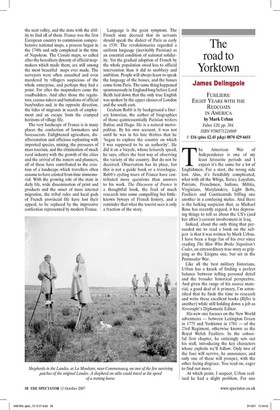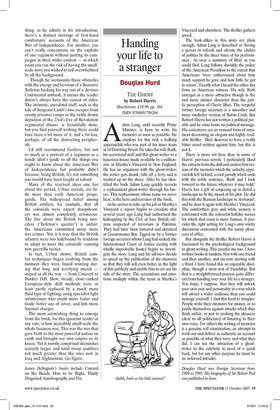The road to Yorktown
James Delingpole FUSILIERS: EIGHT YEARS WITH THE REDCOATS IN AMERICA by Mark Urban Faber, £20, pp. 384, ISBN 9780571224869 £16 (plus £2.45 p&p) 0870 429 6655 The American War of Independence is one of my least favourite periods and I expect it's the same for a lot of Englishmen. For a start, the wrong side lost. Also, it's fiendishly complicated, what with all the Whigs, Tories, Loyalists, Patriots, Frenchmen, Indians, Militia, Virginians, Marylanders, Light Bobs, Fusiliers and Continentals biffing one another in a confusing melee. And there is the lurking suspicion that, as Michael Rose has recently argued, it has depressing things to tell us about the US's (and her allies') current involvement in Iraq.
Indeed, about the only thing that persuaded me to read a book on the subject is that it was written by Mark Urban. I have been a huge fan of his ever since reading The Man Who Broke Napoleon's Codes, an extraordinary true story as gripping as the Enigma one, but set in the Peninsular War.
Like all the best military historians, Urban has a knack of finding a perfect balance between telling personal detail and the broader historical perspective. And given the range of his source material, a good deal of it primary, I'm astonished that he finds the time to research and write these excellent books (Rifles is another) while still holding down a job as Newsnight's Diplomatic Editor.
His new one focuses on the New World adventures — between Lexington Green in 1775 and Yorktown in 1781 — of the 23rd Regiment, otherwise known as the Royal Welch Fusiliers. In the colourful first chapter, he enticingly sets out his stall, introducing the key characters whose exploits we'll follow. Only two of the four will survive, he announces, and only one of these will prosper, with the other facing disgrace. You read on, eager to find out more.
At which point, I suspect, Urban realised he had a slight problem. For one thing, as he admits in his introduction, there's a distinct shortage of first-hand combatants' accounts of the American War of Independence. For another, you can't really concentrate on the exploits of one regiment without putting its campaigns in their wider context — at which point you run the risk of having the smallscale story you wished to tell overwhelmed by all the background.
Though he surmounts these obstacles with the energy and heroism of a Banastre Tarleton hacking his way out of a devious Continental ambush, it means the reader doesn't always have the easiest of rides. The intimate, anecdotal stuff, such as the tale of Sergeant Lamb's two escapes from enemy prisoner camps or the richly drawn depiction of the 23rd's Eve of Revolution regimental dinner, is beautifully done, but you find yourself wishing there could have been a bit more of it, and a bit less, perhaps, of all the distracting peripherals.
I'd still recommend Fusiliers, but not so much as a portrait of a regiment as a handy idiot's guide to all the things you ought to know about the American War of Independence but probably didn't because, being British, it's not something you would have been taught at school.
Many of the received ideas one has about the period, Urban reveals, are little more than early American propaganda. The widespread belief among British soldiers, for example, that all the colonials were expert sharpshooters was almost completely erroneous. The line about the British being merciless (Tarleton's quarter') is unfair: the Americans committed many more war crimes. Nor is it true that the British infantry were too hidebound by tradition to adapt to meet the colonials' cunning new guerrilla tactics.
In fact, Urban shows, British combat techniques began evolving from the moment they were found wanting during that long and terrifying march — sniped at all the way — from Concord to Bunker Hill. Slow, steady, close-ranked European-style drill methods were at least partly replaced by a much more fluid type of fighting, using specialist light infantrymen who could move faster and made better use of cover, and lots more bayonet charges.
The most astonishing thing to emerge from the book, for this ignorant reader at any rate, is how incredibly small-scale the whole business was. This was the war that gave birth to the most powerful nation on earth and brought our own empire to its knees. Yet it mostly comprised skirmishes scarcely larger and total troop numbers not much greater than the ones now in Iraq and Afghanistan. Go figure.
James Delingpole's books include Coward on the Beach, How to be Right, Thinly Disguised Autobiography and Fin.




































































 Previous page
Previous page